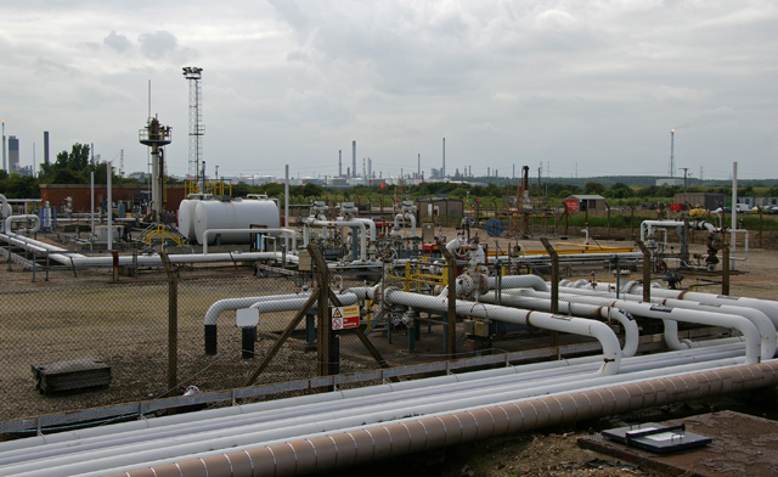 Humber Bank Oil and Gas Facilities. Photo: David Wright / CC BY-SA 2.0, license linked at bottom of article
Humber Bank Oil and Gas Facilities. Photo: David Wright / CC BY-SA 2.0, license linked at bottom of article
As the UK’s energy crisis deepens, Chris Nineham looks at the roots of the gas shortage in the neoliberal economic system
Suddenly, deep crisis looms. The symbolism is all from the 1970s. The media warns about a winter of discontent, the British Chamber of Commerce reports that big companies are discussing putting factories on a three or four day week.
A number of things have come together to create what threatens to be a perfect storm. Background inflation has been ramping up for some time, the Tories’ plans to end the furlough and the ‘uplift’ to Universal Credit were always going to hit millions of people hard Meanwhile, a skills shortage, particularly acute in transport, is threatening basic supplies.
The gas crisis promises to supercharge this situation, pumping up inflation, creating a cost of living crisis for a huge number of people and a potentially disastrous political crisis for the government. Energy bills themselves are set to go up by an average of £139 in October.
But the gas shortage is likely to have a knock on effect across the economy. Steelmakers and chemical manufacturers are all highly vulnerable to increased energy prices. The food industry depends on steady supply of CO2, a by-product of the gas industry. ‘Christmas’ say meat industry spokespeople, ‘is about to be cancelled’.
Many commentators have been blaming Brexit for this mess. Johnson has put it down to an international gas shortage. Both are largely wrong. There is an international crisis but the extreme situation in Britain is more than anything a product of an unsustainable economic model that has been pursued by this government and its predecessors for years.
Gas prices have been rising around the world. Shortages have been caused by increasing demand during the pandemic and the extra cold winter in the US as well as surging energy demands from the continuing expansion of the Chinese economy in particular.
But nowhere else so far is reporting the kind of meltdown looming in Britain. Gas prices in the US are one fifth of those here. Although rattled, many European governments are stepping in with investments and seem confident that they can keep their economies up and running. Britain’s particular agony is a result of its extreme commitment to free market economics.
First of all Britain’s low level of investment in general and in renewables in particular has come back to bite us. Britain relies disproportionately on old, fossil fuel, gas burning power stations which currently produce more than fifty per cent of our electricity. This despite the fact that Britain enjoys the most propitious geographical conditions for wind power anywhere in Europe.
But the situation has been made worse in recent months because of a string of failures in the UK electricity system, including the shutdown of a major power cable used to import electricity from France.
The way our energy market is structured has made matters worse. Radical deregulation of the market in 2014 made it simple for energy companies to set up without proper links to banks or investors. This led to the absurd situation in which at the start of this year Britain’s energy market was parcelled out to 70 different companies. Many of these ‘energy companies’ – most of which are little more than gambling vehicles for investors trying to corner the market by price cutting – don’t have the financial backup to deal with price changes. As a result, many of them have already gone bust and experts believe that 39 suppliers could fail in the next year, leaving just 10 viable companies. This is the same number of suppliers that existed twenty years ago.
The ‘just in time’ supply methods generated by this super competitive market makes it is peculiarly unable to respond to sharp changes in demand. On top of this the Tories’ ideological aversion to planning means that have some of the lowest energy reserves in the world. In 2017, Centrica was allowed to close Britain’s largest gas storage site, with the Tories claiming the market knew best. Most European countries have several weeks back up whereas in Britain we just three days, equivalent to just one per cent of Europe’s stored gas.
As the Financial Times warns, for the bosses and the government, ‘(t)here are no solutions to this crisis, only politically nightmarish choices around hard realities’. As with the pandemic, one option is for governments to intervene and sort the situation out. For the FT this choice is a little bit ‘too much like a return to the 1970s.’
The other option is of course for the government to let a lot more people than usual starve or freeze this winter. Which way this goes may well depend on whether we can turn this discontent into active opposition this winter.
Join Revolution! May Day weekender in London
The world is changing fast. From tariffs and trade wars to the continuing genocide in Gaza to Starmer’s austerity 2.0.
Revolution! on Saturday 3 – Sunday 4 May brings together leading activists and authors to discuss the key questions of the moment and chart a strategy for the left.

